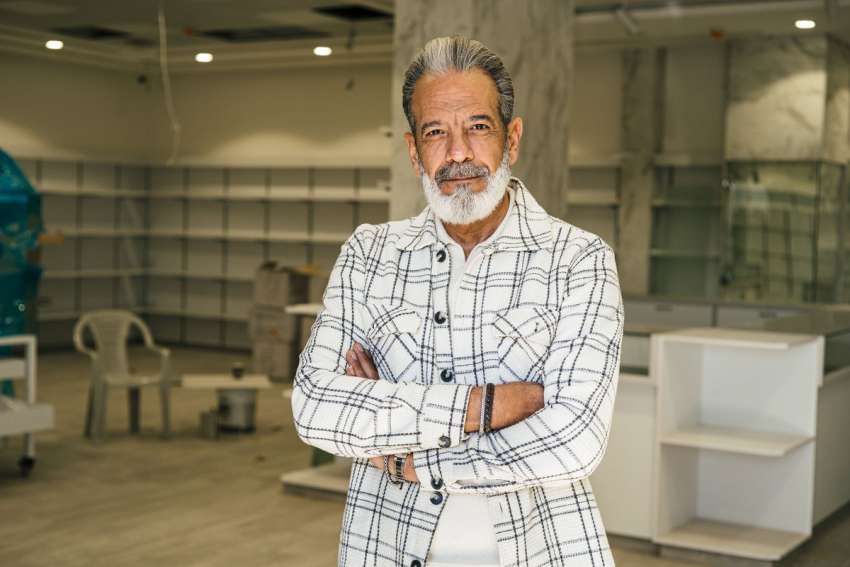In the birthplace of hope, Shibly Kando's Christmas is marked by uncertainty as war has left his long-planned shop empty and his community struggling to survive.
Kando's new store, located between the Shepherds' Field and the heart of Bethlehem, was set to open on Oct. 12, 2023. However, the terrorist attack five days earlier and the subsequent Israel-Hamas war changed everything in the region, halting construction on the shop.
"This was my life savings," Kando shared, his voice heavy with emotion. "Everything was ready -- merchandise bought, shelves designed with care. We were just days from opening, and then … everything stopped." Now, for 14 months, the unfinished shop has sat empty.
Kando's store, planned as a chic and up-to-date religious goods store -- selling traditional olive wood carvings, jewelry, mosaics, antiquities and more -- now stands as a haunting monument of the conflict's toll. The brilliant white interiors, designed to brighten the space and lift visitors' spirits, echo with an eerie silence. Without tourists, Bethlehem's Christian community, which relies heavily on pilgrimage-driven tourism, faces an existential crisis.
"Tourism is the bread and butter for Christians in Bethlehem," Kando explained. "Each shop like mine supports 80 to 150 families -- carvers, artisans and workers. Without visitors, the whole ecosystem collapses." According to Kando, 90% of Bethlehem's Christians depend on tourism for income.
The conflict has left deep scars. Kando, like many others, watches families emigrate, unable to endure the uncertainty. "Once they leave, they don't return," he said. "It feels like there's a plan to evacuate the country of Christians. It's heartbreaking."
More than 68 Christian families have left Bethlehem in the last six months, Kando told OSV News. A lifelong advocate of preserving Christianity in the Holy Land, he admits that now when Christians begin to discuss leaving, he doesn't know what to do. "I'm speechless. I don't know what to say, except telling them to pray."
For Bethlehem's Christians, the challenges extend beyond economic struggles. Kando voiced fears that the Holy Land's sacred sites might become mere museums -- destinations for fleeting visits, stripped of the living communities that give them life. "We are the salt of this land. We want to stay and to practice our faith in our churches."
Kando's grandfather owned a souvenir shop near the Holy Sepulchre in Jerusalem, which he subsequently moved outside the city walls as Jerusalem changed. In 1999, Kando moved the shop to Bethlehem, near Rachel's Tomb, but increasing conflicts surrounding that site have made the location undesirable.
Despite the hardships, Kando and his community find ways to endure. He is a volunteer administrator for Select to Give, a American-based nonprofit that supports Christians in the Holy Land. Local initiatives, like women's workshops and educational sponsorships for children, provide glimmers of hope.
Currently, Select to Give sponsors 90 children in Christian schools, which makes a considerable difference in family life and helps form young people with a Christian identity. Select to Give has contributed more than $250,000 to Christians in need in the region in 2024.
Yet, the weight of the ongoing conflict casts a long shadow over such efforts.
This Christmas, as Bethlehem observes the feast of Christ's birth, the joy is tempered by the struggles of those who call this sacred town home. Kando's plea is simple yet profound: "Pray for us. Stand by us. We are fighting to keep the heart of Bethlehem alive."
It is a poignant reminder that the Christmas story, rooted in Bethlehem, is one of light breaking through darkness -- a hope Kando and his community cling to as they face an uncertain future.
Ahead of Christmas, during his visit to Germany's headquarters to the pontifical charity Aid to the Church in Need, Cardinal Pierbattista Pizzaballa, Latin patriarch of Jerusalem, urged the pilgrims to return to the Holy Land.
"It is important to think about returning to the Holy Land. Bethlehem, Nazareth, Jerusalem, are safe cities, it is important to come and there is hope for the future. We need people to return," said Cardinal Pizzaballa, repeating the call during his pre-Christmas meeting with journalists in Jerusalem.


